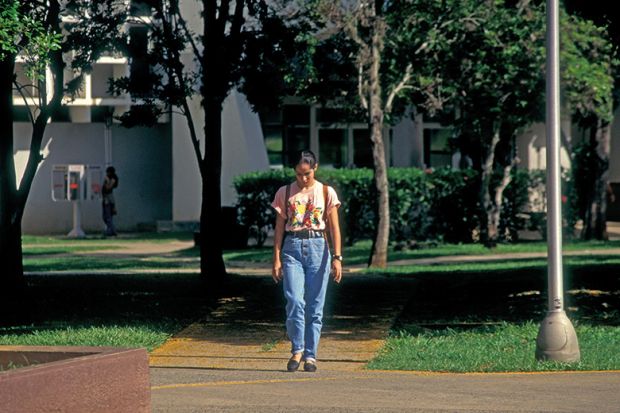The higher education attainment gap between Latino people in America and their white and black counterparts is widening, according to new research.
A study from Georgetown University’s Center on Education and the Workforce finds that the share of Latinos in the US who obtained at least some postsecondary education increased from 35 per cent to 45 per cent between 1992 and 2016.
But even though more Latinos are going to university, the rate of growth for white and black people during this period was even greater.
Last year, Latinos were 26 percentage points behind whites and 21 percentage points behind blacks in postsecondary attainment, compared with 23 percentage points and 10 percentage points respectively in 1992.
In addition, while Latino Americans and whites with high college admissions test scores have similar rates of college enrolment, only 63 per cent of these Latinos complete a degree or other qualification compared with 78 per cent of whites.
Overall only 21 per cent of Latinos have bachelor’s degrees compared with 32 per cent of blacks and 45 per cent of whites.
Meanwhile, almost two-thirds (65 per cent) of Latino students enrol in “overcrowded and underfunded community colleges with low graduation rates” and only 15 per cent enrol in one of the 500 most selective colleges that have much higher graduation rates, according to the study.
The report, Latino Education and Economic Progress: Running Faster but Still Behind, which was based on an analysis of five databases including the Integrated Postsecondary Education Data System and the Beginning Postsecondary Students Longitudinal Study, argues that Latinos’ education progress “has left them primarily in the middle tier of educational attainment: between high school and bachelor’s degrees”.
“As a result, they are primarily in the middle-skill sub-baccalaureate labor market,” it states.
But even when Latino Americans obtain college degrees, they are less likely to work in graduate-level jobs than white and black people, according to the research.
Latinos comprise 16 per cent of workers in the US but hold just 10 per cent of jobs that require at least some postsecondary education, 9 per cent of jobs that require a bachelor’s degree and 7 per cent of jobs requiring a graduate degree.
Megan Fasules, assistant research professor at the Center on Education and the Workforce and co-author of the report, said that universities should “make the financial aid process more transparent” to increase the share of Latino Americans enrolling in and graduating from higher education.
“Many Latinos do not even apply to four-year colleges, especially the most selective colleges, because they fear they cannot afford it. They are unaware that they are unlikely to pay the sticker price,” she said.
“Students who attend these colleges are more likely to graduate because the financial resources at these institutions are larger and can spend more per student.”




